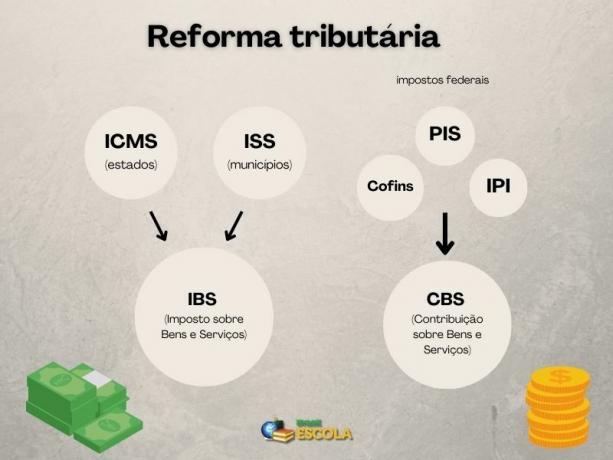A tax reform had its basic text approved early this Friday (7) in the Chamber of Deputies. The debate on the renewal of the Brazilian tax system has lasted almost 30 years.
The aim of the reform is change the way taxes are collected in Brazil with the intention of simplifying tax collection.
The project is a Constitutional Amendment Proposal (PEC) and will go to vote by the Federal Senate.
As it was a PEC, 308 favorable votes were needed from the 513 federal deputies. The second round score stood at 375 in favor and 113 against.

Credit: Lula Marques / Agência Brasil.
In this first stage of the reform, the focus is on consumption. Income taxation, for example, should be discussed later.
Among the changes in the last version of the text of the proposal are the prediction of zero the tax on the basic food basket and create a tax that can be levied on products that are harmful to health or the environment.
Read too: What is the Personal Income Tax (IRPF)
What is tax reform?
A tax reform will unify taxes collected in Brazil. Currently, Brazilians pay, among the main taxes, five types of taxes.
These taxes are characterized as indirect, which are those included in the circulation of goods, explains tax lawyer Lucas Terto.
In this unification a Value Added Tax (VAT) will be created, dual, formed by two types of taxes. These taxes will be the IBS (Tax on Goods and Services) and the CBS (Contribution on Goods and Services).
Check out how the unification of taxes with the tax reform will be:

The rules of these two taxes, IBS and CBS, must be the same and these taxes will have a single rate. However, there will be some adaptations according to the sectors. While some will have a 50% reduction in the rate, in others it will be zero.
Among the sectors that will have a reduced rate are education, health, medicine, culture, agricultural products and public passenger transport services.
The proposal should also create the Federal Selective Tax which will be charged on cigarettes and alcoholic beverages. The intention is to discourage the consumption of these products that are harmful to health.
What changes with the tax reform?
According to the tax specialist, Pedro Abdo, tax reform should affect the entire Brazilian tax system, especially taxes on consumption, goods and services.
According to the Abdo, the reform should provoke a bureaucracy in the tax system. The tax collection scenario must become progressive, that is to say, whoever earns more must pay proportionally more tax.

The tax specialist also points out that the change may result in the reduction of social and regional inequalities. "Increase the competitiveness of Brazilian products abroad and facilitate the arrival of foreign companies to Brazil", he adds.
Overall, the impacts on the Brazilian's pocket should be low. In Abdo's perspective, this reform should benefit people with lower incomes more, increasing the purchasing power of this population.
llírio José Rech, a professor at the Federal University of Goiás (UFG), explains about reducing tax injustice for the poorest:
"The poorest spend most of their earnings on day-to-day expenses (food, clothing, transport, energy, medicine, which has high tax rates) while the richest spend on travel, boats, planes, real estate, health plans and schools, etc. etc., whose taxation is, proportionally, much lower than that levied on basic consumption items. The approved proposal partially corrects these injustices, exempting several consumption items from the basic food basket, health, transportation, education, etc."
Ilírio José Rech, PhD in Accounting and Controllership from the University of São Paulo (USP)
O cashback that entered the debate from the tax reform refers to the return to the pocket of those with lower income and that income is more impacted by taxes, explains tax lawyer Lucas Third.

The adoption of the single tax can bring greater transparency for the system and facilitate the identification of tax injustices, argues Terto.
Know more:What is the IRS
When does the tax reform take effect?
The tax reform must be implemented from a transition phase, expected to last between 2026 and 2032.
In this transition period, there will be a reduction in taxes that are charged today and an increase in those created with the tax reform. Check out the demonstration of this transition in the graphic below:
Credit: Disclosure / Chamber of Deputies.
Do not stop now... There's more after the publicity ;)
What are the taxes paid today by Brazilians?
Among the main taxes currently paid by Brazilians are:
Federal taxes:
IPI: Tax on Industrialized Products
PIS: Social Integration Program
Cofins: Contribution to Financing Social Security
State and city taxes:
ICMS: Tax on Circulation of Goods and Services (state tax)
ISS: Tax on Services (municipal tax)
By Lucas Afonso
Journalist

